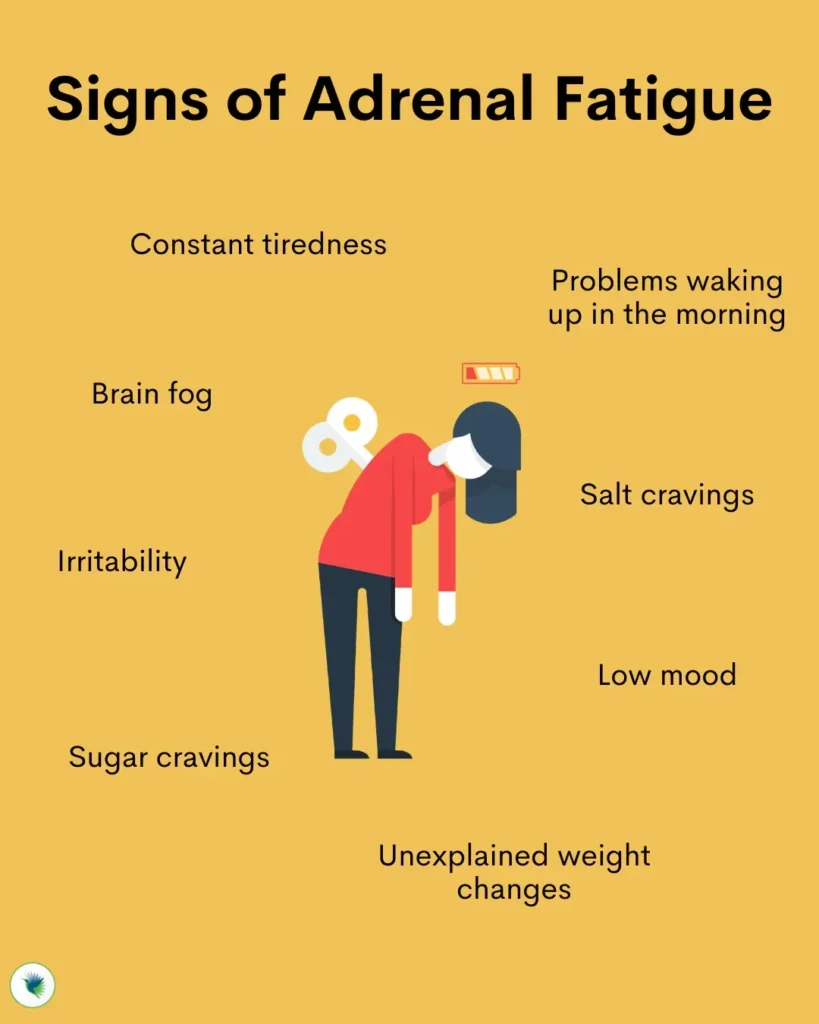Do you constantly feel tired no matter how much food you’re eating? You got 8 hours of sleep last night, but still feel drowsy. And you have been feeling a constant state of exhaustion. Chances are you might be suffering from Adrenal fatigue.
What is adrenal fatigue?
Adrenal fatigue is a condition in which the adrenal glands, which are responsible for producing hormones such as cortisol and adrenaline, become exhausted and are unable to produce sufficient levels of these hormones. Burnout, on the other hand, is a state of emotional, physical, and mental exhaustion caused by prolonged stress. Symptoms of adrenal fatigue include fatigue, difficulty getting out of bed in the morning, brain fog, low blood pressure, sugar and salt cravings, and difficulty handling stress. So you may not be feeling your mojo majorly because your glands are tired and not producing enough cortisol to keep you on your toes all the time.
Let’s look at why it happens:
There are several potential causes of adrenal fatigue. One of the main causes is chronic stress. Stress is anything that exceeds an individual’s capacity to cope. Too many projects with short-term deadlines may cause stress. When the body is exposed to stress, the adrenal glands release cortisol and other hormones to help the body cope. However, if the stress is chronic and prolonged, the adrenal glands can become exhausted and stop producing sufficient levels of these hormones. Other causes of adrenal fatigue include poor diet, lack of sleep, and chronic infections or illnesses.

Adrenal fatigue vs Burnout
Adrenal fatigue is different from burnout. Burnout is a state of emotional, physical, and mental exhaustion caused by prolonged stress. So burnout is a stage that follows Adrenal fatigue. Symptoms of burnout include exhaustion, cynicism, and a feeling of being disconnected from work or other activities that were once enjoyable. Burnout can also cause physical symptoms such as headaches, digestive issues, and difficulty sleeping. There are several potential causes of burnout. One of the main causes is chronic stress, particularly when the stress is related to work. Other causes of burnout include lack of control or autonomy in the workplace, unclear job expectations, and lack of social support. Burnout is evident in mostly all jobs given the workload and the timings that everyone works towards. However, it is not an end-all situation. We still have the power to minimise if not erase the burnout.
If you are experiencing symptoms that you believe may be related to adrenal fatigue or burnout, it is important to consult with a qualified healthcare professional to rule out any underlying medical conditions. That being said, the treatment approach for these conditions is similar to that for managing stress and improving overall health and well-being.
Here are 8 strategies that may be helpful:
- Get enough sleep: Aim for 7-9 hours of sleep each night to help your body recover and recharge.
- Manage stress: Engage in stress-reducing activities such as yoga, meditation, or deep breathing exercises.
- Eat a healthy diet: Consume a well-balanced diet rich in whole foods, fruits, vegetables, lean proteins, and healthy fats.
- Exercise regularly: Moderate exercise, such as walking or cycling, can help reduce stress and improve energy levels.
- Prioritize self-care: Make time for activities that you enjoy, such as reading, taking a bath, or spending time with loved ones.
- Set boundaries: Learn to say no to things that drain your energy and prioritize activities that are important to you.
- Seek support: Consider talking to a therapist or counsellor to help manage stress and improve coping skills.
- Consider supplements: Talk to your healthcare provider about supplements that may support adrenal function.
Remember, it is important to consult with a healthcare professional before making any significant lifestyle changes or taking any supplements, especially if you have underlying medical conditions or are taking medication.
